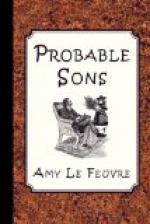“Where is my cigar-case? I will go and have a smoke to get rid of this fit of the blues. I shall have to curb that child’s tongue a little. She is getting too troublesome.”
And while he was pacing moodily up and down the terrace outside, a little white-robed figure, with bent head and closed eyes, was saying softly and reverently as she knelt at her nurse’s knee—
“And, O God, bring Tommy back, and don’t let him be a probable son any more. Bring him home very soon, please, and will you bring back all your probable sons who are running away from you, for Jesus Christ’s sake. Amen.”
Sir Edward did not escape several visits from ladies in the neighborhood offering to befriend his little niece, but all these overtures were courteously and firmly rejected. He told them the child was happy with her nurse, he did not wish her to mix with other children at present, and a year or two hence would be quite time enough to think about her education. So Milly was left alone, more than one mother remarking with a shake of the head—
“It’s a sad life for a child, but Sir Edward is peculiar, and when he gets a notion into his head he keeps to it.”
The child was not unhappy, and when the days grew shorter, and her rambles out of doors were curtailed, she would lie on the tiger-skin by the hall fire with Fritz for the hour together, pouring out to him all her childish confidences.
Sometimes her uncle would find her perched on the broad window-seat half-way up the staircase, with her little face pressed against the windowpanes, and late on one very cold afternoon in November he remonstrated with her.
“It is too cold for you here, Millicent,” he said sternly; “you ought to be in the nursery.”
“I don’t feel cold,” she replied. “I don’t like being in the nursery all day; and when it gets dark, nurse will have the lamp lit and the curtains drawn, and then there are only the walls and ceiling and the pictures to look at. I’m tired of them; I see them every day.”
“And what do you see here?” asked Sir Edward.
“You come and sit down, and I will tell you. There’s room, uncle; make Fritz move a little. Now, you look out with me. I can see such a lot from this window. I like looking out right into the world; don’t you?”
“Are we not in the world? I thought we were.”
“I s’pose we are, but I mean God’s world. The insides of houses aren’t His world, are they? Do you see my trees? I can see Goliath from this window; he looks very fierce to-night; he has lost all his leaves, and I can almost hear him muttering to himself. And then, uncle, do you see those nice thin trees cuddling each other? I call those David and Jon’than; they’re just kissing each other, like they did in the wood, you know. Do you remember? And there’s my beech-tree over there, where I sit when I’m the probable son. It’s too dark for you to see all the others. I have names for them all nearly, but I like to come and watch them, and then I see the stars just beginning to come out. Do you know what I think about the stars? They’re angels’ eyes, and they look down and blink at me so kindly, and then I look up and blink back. We go on blinking at each other sometimes till I get quite sleepy. I watch the birds going to bed too. There is so much I can see from this window.”




